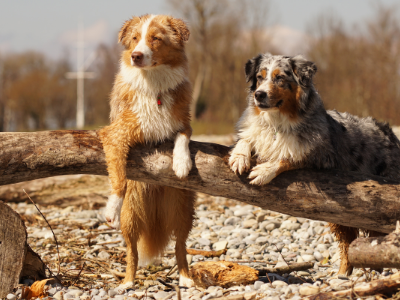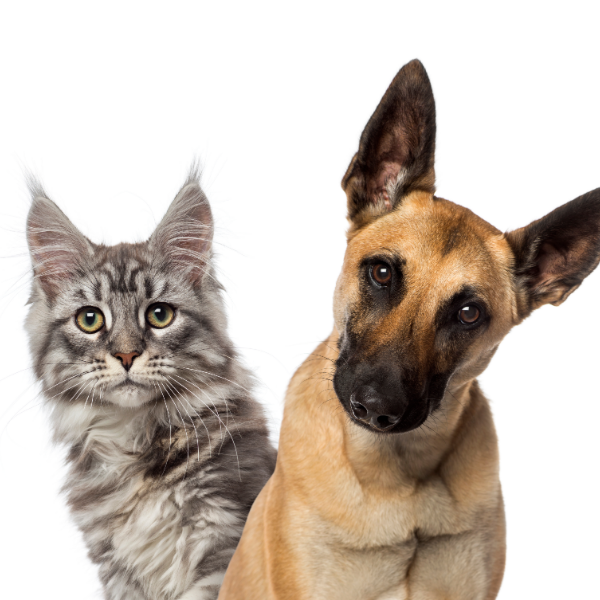1. A Whole Food Diet - GO RAW!
A number of reputable giant-dog breeders discovered that feeding their pups a raw diet was the best defense against improper growth. Essentially, a raw diet provides all the essential nutrients including; minerals, vitamins, collagen, glucosamine, essential fatty acids, and phytonutrients. More specifically, a variety of meaty necks, knuckles, and femurs will provide all of the various nutrients (most importantly calcium and phosphorus) specifically needed for healthy bone and joint development. So, be sure your raw diet is not high in fat and includes adequate lean muscle meat (not all raw foods are equal)!
2. Prevent free radicals! Fight Back with Antioxidants
Free radicals contribute to a faster breakdown of cells, and left unchecked can cause inflammation, oxidation, and degeneration within your puppy’s body. Increasing your pup’s green vegetable intake and adding a powdered green supplement (a rotation of kelp, phytoplankton, chlorella, spirulina, moringa leaf, etc.) can give them additional support against rapid deterioration. Greens are a great source of Vitamin C, E, and B5 which are known to reduce the inflammatory response associated with joint issues. And of course, feeding a clean, whole food diet is the best way to reduce the damage that free radicals can cause. It’s also a great way to increase naturally occurring antioxidants!
3. Don’t Overfeed!
One of the biggest mistakes first-time large breed puppy owners can make is to feed too much. Just like with humans, having an overweight puppy puts tremendous strain on their bones and joints while they are growing. Especially with large breed puppies, who tend to grow rapidly regardless, and by overfeeding you can accelerate the degenerative process. By keeping your pup lean and not overfeeding, you can help him develop more naturally and gradually to ensure his bones and joints form correctly. Advice: Be sure that you are not feeding a raw diet that is high in fat, no higher than 5-10%. Protein should be between 12-18% if feeding a raw diet. Do not overfeed protein to your large breed puppy!
4. Correct Exercise is a Must!
Finding the best type of exercise for your puppy can be tricky too. Your large breed puppy should not be climbing stairs excessively, playing jumping games, jumping in and out of the car, chasing the ball for long periods of time, or starting agility training- more specifically, jumps- until they are sturdier and their growth is well on the way to being finished. The best types of exercise for any large breed pups are easy walking, playing with others, and swimming! Teach your pup to swim as early as possible, even if it means you have to pay to use a heated pool. Trail walks on softer surfaces are ideal. Make everything fun and easy!
5. Don't Forget Your EFA’s
It’s well-documented that essential fatty acids contain anti-inflammatory nutrients, omegas 3,6, and 9. These fats help reduce wear and tear on your pup's joints and help with optimal growth during puppyhood. Do not forget to add these important nutrients to your growing pup’s diet! Raw meats do contain EFA’s but the more variety you give, the better. Try any of the following: cold-pressed salmon, sardine, mackerel, krill, hemp, coconut, and flax. Rotate these oils for the most variety and the best results. Plus, purchase only cold-pressed oils in smaller containers and then refrigerate. This way you’ll use them quickly, buy them more often, and avoid them going “off.”
6. Puppies Can Benefit from Neutraceuticals Too!
Neutraceuticals are food-based supplements that help to prevent and/or support all types of diseases, plus they can help alleviate some existing ones. Consult your holistic veterinarian to see what the best option is for your puppy. Some common formulas that are specifically designed for joints include glucosamine, MSM, and Perna mussel.
Prevention is a huge part of raising a healthy puppy and large breeds can be particularly challenging due to their rapid growth rate. Go slow and steady with everything you do and provide top-notch nutrition to allow the body to grow in a natural fashion: not too fast! Learn more about raw diets for dogs by clicking here.



